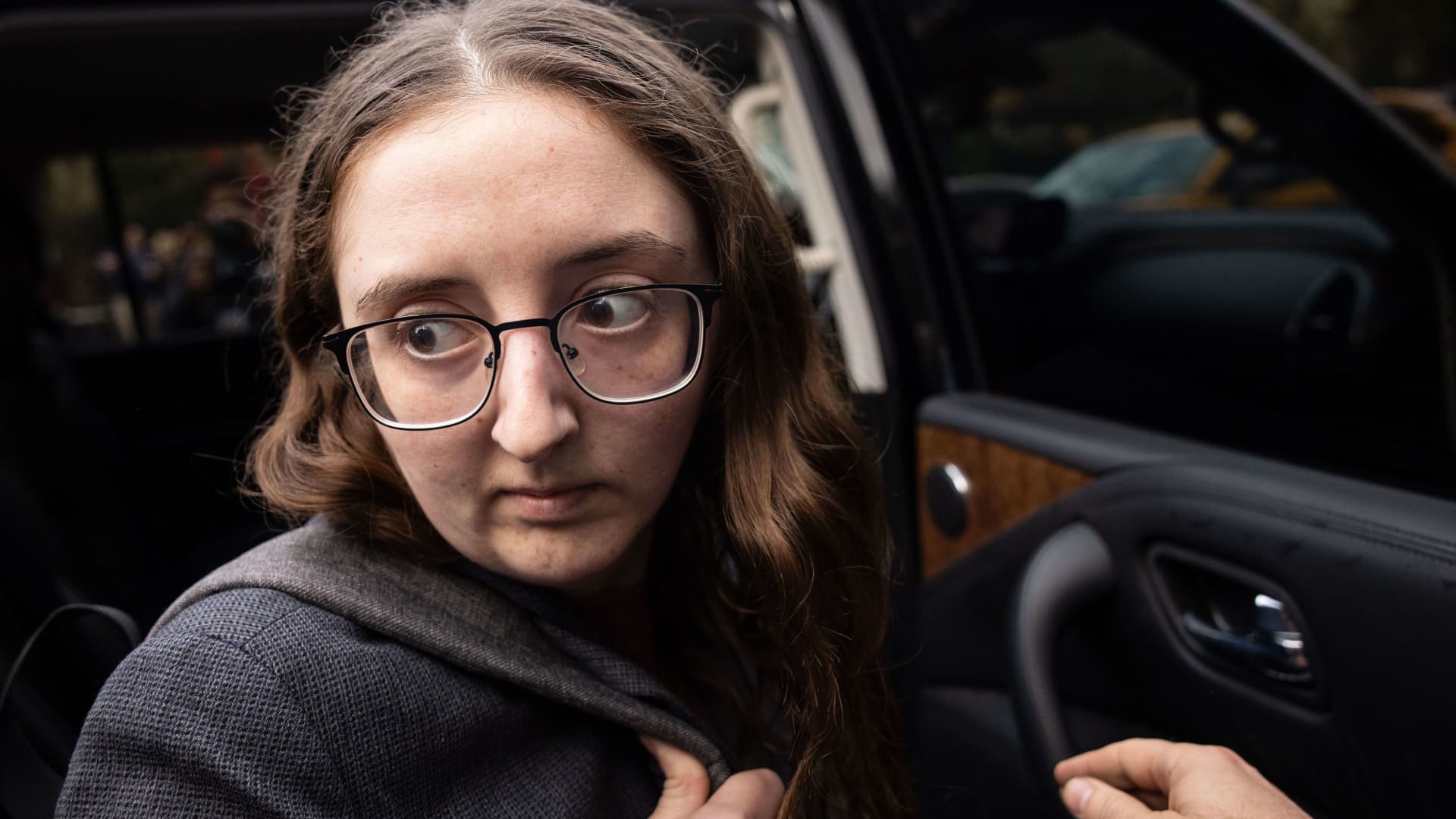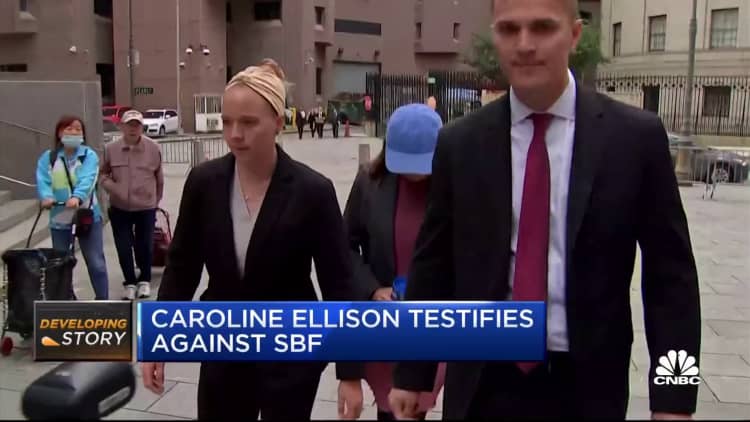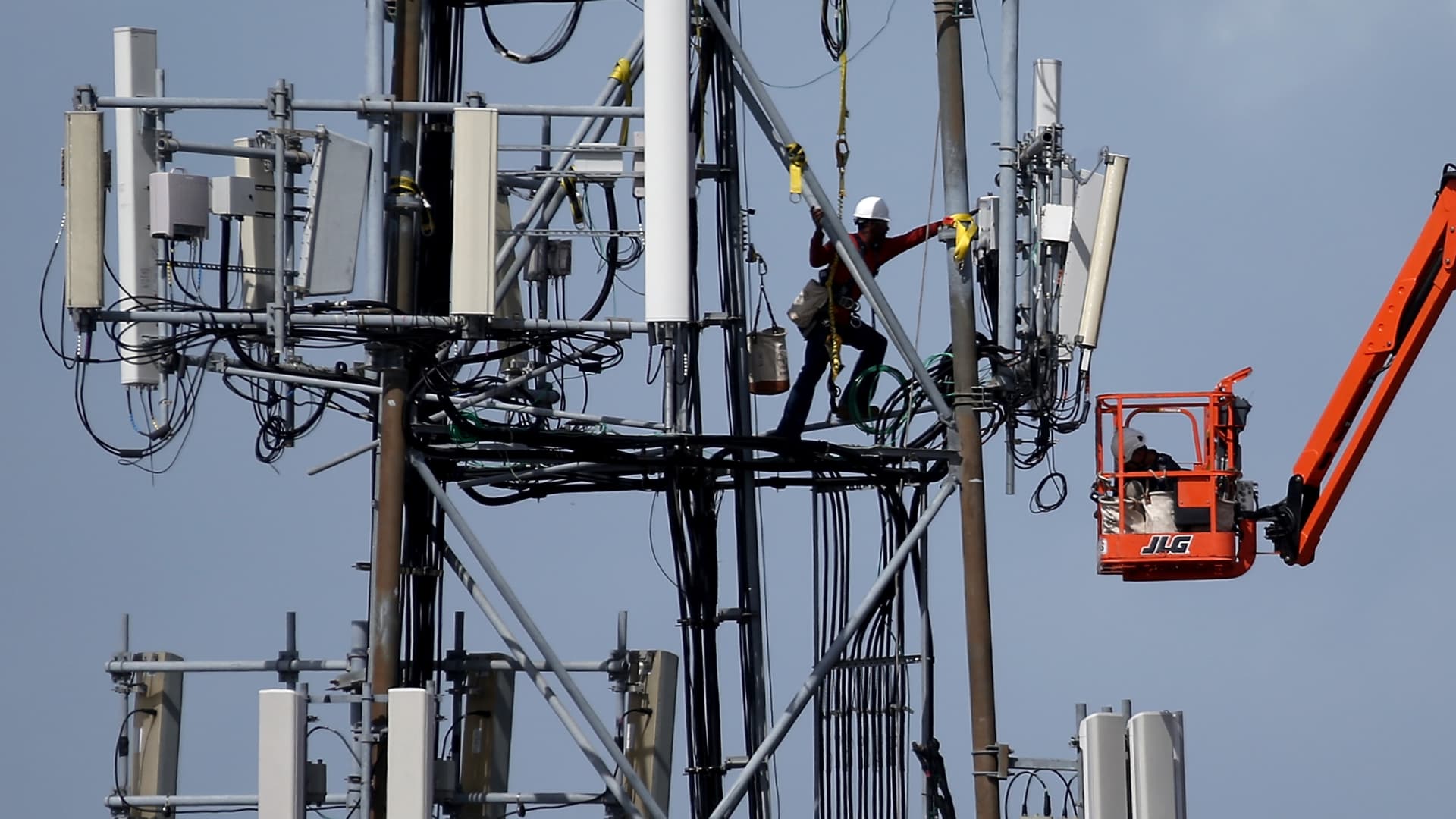
Caroline Ellison, former chief executive officer of Alameda Research LLC, exits court in New York, US, on Tuesday, Oct. 10, 2023.
Yuki Iwamura | Bloomberg | Getty Images
Caroline Ellison, who ran Sam Bankman-Fried’s crypto hedge fund while also dating the FTX founder, told jurors in her second day of testimony that one way her boss was considering repaying FTX customer accounts was by raising money from Saudi Crown Prince Mohammed bin Salman.
Ellison, 28, pleaded guilty in December to multiple counts of fraud as part of a plea deal with the government and is now viewed as the prosecution’s star witness in Bankman-Fried’s trial. In damning testimony on Tuesday, she said Bankman-Fried directed her and other staffers to defraud FTX customers by funneling billions of dollars to sister hedge fund Alameda Research.
Assistant U.S. attorney Danielle Sassoon wasted no time diving back into the questioning when court was called to session at 9:30am.
After previously detailing how FTX customer funds were used to repay Alameda loans, Ellison said on Wednesday that crypto lender Genesis called back a bunch of loans in 2022 and asked to see a balance sheet. Because Alameda’s actual balance sheet showed it had $15 billion in FTX customer funds, Bankman-Fried directed Ellison on June 28, 2022, to come up with “alternative” balance sheets that didn’t look as bad, she said.
Ellison, wearing a buttoned gray blazer with her long hair swept over her left shoulder, said she discussed her concerns with Bankman-Fried as well as top execs Gary Wang and Nishad Singh. She said the group brainstormed ways to make the balance sheet look better.
Assistant U.S. Attorney Danielle Sassoon questions Caroline Ellison as defense lawyer Mark Cohen stands to object at Sam Bankman-Fried’s fraud trial before U.S. District Judge Lewis Kaplan over the collapse of FTX, the bankrupt cryptocurrency exchange, at Federal Court in New York City, U.S., October 11, 2023 in this courtroom sketch.
Jane Rosenberg | Reuters
After the meeting, Ellison prepared a number of different balance sheet variations to send to Genesis. Eventually, according to Ellison, Bankman-Fried chose the one that omitted a line saying “FTX borrows,” hiding $10 billion in borrowed customer money. “Some was netted against related-party loans,” she said, and “some netted against crypto.”
That made it seem “like we had plenty of assets to cover our open term loans,” Ellison said.
Ellison told jurors she “was in a constant state of dread” since she knew there were billions of dollars of loans being recalled that could only be repaid with money from FTX customers. She said she was “worried about the possibility of customer withdrawals” that could happen at any time.
“I was concerned that if anyone found out, it would all come crashing down,” Ellison said. When asked by Sassoon why she continued with the scheme, Ellison said, “Sam told me to.”
By October 2022, the internal balance sheet had liabilities of $15.6 billion, while the numbers they showed the lender indicated just under $8 billion. Ellison said Bankman-Fried was talking about trying to raise money from Mohammed bin Salman, also known as MBS, as a way to make FTX customers whole.
Disappearing Signal messages
Ellison, a Stanford graduate and one of Bankman-Fried’s earliest recruits to Alameda in 2017, was reportedly convinced by Bankman-Fried to ditch her job at Wall Street trading firm Jane Street to join Alameda as a trader. At the time, the hedge fund was still in its original office in the San Francisco Bay area.
Six years later, Ellison is testifying against the 31-year-old Bankman-Fried, who faces seven federal charges, including wire fraud, securities fraud and money laundering, all tied to the collapse of FTX and Alameda late last year. If convicted in the trial that began last week, Bankman-Fried could spend his life in prison. He has pleaded not guilty.
Ellison said Bankman-Fried directed FTX and Alameda employees to use the disappearing message setting on Signal and told them to be very careful about what they put in writing because of potential legal exposure. In addition to a companywide meeting about the Signal policy, Bankman-Fried also told employees that when it comes to Slack, they should only write things that they’re comfortable seeing on the front page of the New York Times.
Caroline Ellison, former CEO of Alameda Research, center, arrives at court in New York on Oct. 10, 2023.
Yuki Iwamura | Bloomberg | Getty Images
Backing up to the summer and fall of 2022, Ellison provided more detail about her interactions with Bankman-Fried as his crypto firms’ financial problems were becoming more apparent. Ellison said the two ways they talked about bringing in more money for FTX were by acquiring BlockFi or by selling equity.
In August of last year, Ellison said Bankman-Fried told her that Alameda’s finances were her fault even though she’d been warning about FTX’s expanding portfolio of venture investments and the need to repay FTX customer accounts. Bankman-Fried told her she should have hedged and, “speaking loudly and strongly,” said it was “her fault.”
On the stand, Ellison took some blame, admitting she should have done things differently, “but Sam was the one who chose to make all the investments that put us in a leveraged position,” she said.
Ellison, who’d started dating Bankman-Fried in the summer of 2021, said that by the fall of 2022 they’d been broken up for several months. She said she would try to avoid one-on-one contact with Bankman-Fried, though they were still talking on Signal and were together in group meetings. She said she still provided him the same regular updates on Alameda and its balance sheet.
Ellison said she kept a Google Doc that had a subcategory labeled, “things Sam is freaking out about.” It included, “raising from MBS,” as well as “getting regulators to crack down on Binance,” a rival exchange that was also an early investor in FTX. Bankman-Fried wanted to see Binance feel some pain because he saw that as the best way for FTX to increase market share, Ellison said.
Another worry on the list was, “bad pr in the next six months,” which Bankman-Fried feared would interfere with FTX’s efforts to obtain a license for futures trading in the U.S.
WATCH: Ellison says “Sam directed me to commit these crimes”








